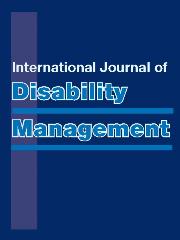Article contents
Work Participation After Acquired Brain Injury: Experiences of Inhibiting and Facilitating Factors
Published online by Cambridge University Press: 23 February 2012
Abstract
Aim: The aim of this study was to provide new insight into the factors that affect work participation by those with cognitive deficits following an acquired brain injury. Method: The study had a qualitative exploratory design, with three focus-group interviews used to collect data. The first group comprised workers with experience of cognitive deficits after a traumatic brain injury (TBI), anoxic brain damage and stroke, the second group professionals from specialist levels of social security service and the third professionals from specialised health care services. Transcribed interviews were analysed using a conventional approach to content analysis. Major findings: A broad range of factors affected work participation. Personal factors, the psychosocial adaptation process, injury-related consequences as well as factors in the working environment were found to inhibit work participation. Acceptance of a different level of functioning and a new role in working life was an important but time-consuming process. Significant working-environment barriers were workplace demands, the attitudes of employers and colleagues, complicated information, excessive bureaucracy, too little practice before going back to work and physical barriers. Optimism and being determined were found to be particularly important facilitating personal factors. Important resources provided by the working environment were social support, time-related flexibility, relevant tasks and accommodations.
Keywords
- Type
- Research Article
- Information
- Copyright
- Copyright © Cambridge University Press 2009
- 13
- Cited by


